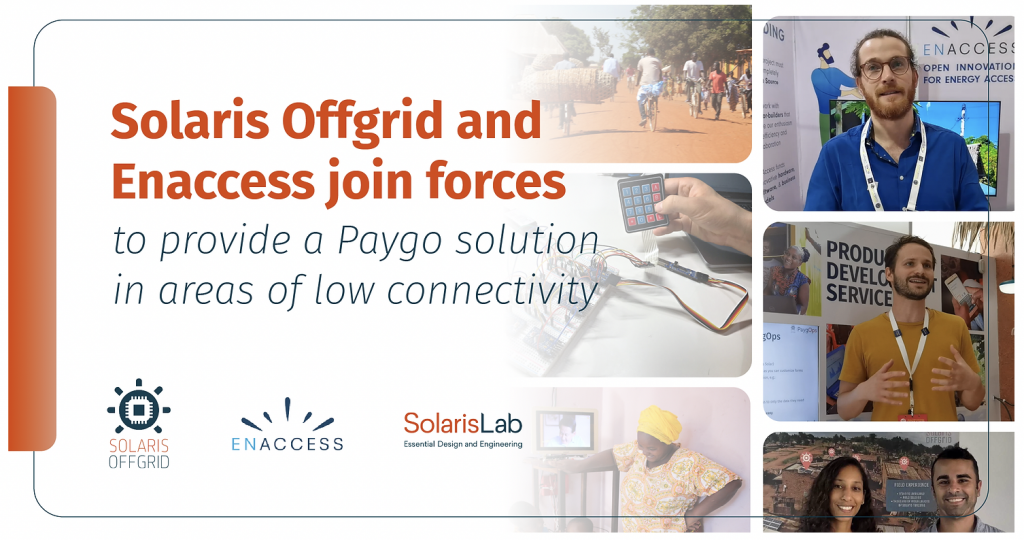This article was originally published on Solarislab.tech in July 2023.
Introducing the OpenPAYGO Pass
Backed by funding from EnAccess, the Solaris Offgrid engineering team, SolarisLab, is working to develop an alternative which permits end users access to Paygo technology in low to no connectivity areas. This collaboration with EnAccess is a continuation of our work together in co-developing OpenPAYGO™ Token, the cornerstone of our OpenPAYGO™ Suite.
EnAccess funds and supports Open Innovation in the energy access sector. They believe that such innovation is necessary in order to achieve universal energy access. As part of their mission, EnAccess focuses on co-creating open source solutions which facilitate the expansion of access to modern energy alternatives to the most disadvantaged populations globally. Additionally, they’ve created an expanding library which houses a variety of open source materials like OpenPAYGO™ Token, and solutions including software, hardware, and toolkits.
Our previous partnership with EnAccess laid the groundwork for OpenPAYGO™ Token, a game-changing development that has transformed the way manufacturers, distributors and end-users embrace Paygo solutions across the board. This collaboration was driven by a mutual vision to create meaningful and lasting impact within the sustainable solar energy access sector. The success and establishment as an industry standard of OpenPAYGO™ Token have created a momentum propelling Solaris Offgrid (via SolarisLab) and EnAccess to the next phase of innovation.
What is the OpenPAYGO Pass?
OpenPAYGO™ Pass technology will simplify the activation process in addition to providing free data feedback in places where cash collection is required for Paygo services. The data feedback can open possibilities for access to result-based financing opportunities to end-users who would otherwise be excluded.
OpenPAYGO™ Pass is the most recent advancement in development from SolarisLab in partnership with EnAccess, fitting comfortably into the OpenPAYGO™ Suite of technologies helping the solar industry move closer to achieving SDG goal 7 of providing widespread access to clean and affordable energy.

This project is being developed to allow end-users residing in low or no connectivity zones to have a seamless Paygo experience through the use of radio frequency identification (RFID) badge mechanisms. Currently, end-users in areas of limited connection have to undergo a time consuming and inconvenient process to activate their Paygo devices.
“We believe in the value of this project as it targets an elementary aspect of Paygo transactions and allows for bi-directional data flows within Paygo projects, which ultimately improves the monitoring of project performance (e. g. in RBF schemes). EnAccess is particularly excited to work with Solaris Offgrid again, a well-known organization that has been developing much-needed Open Source tools for the Energy Access sector for years.” – Vivien Barnier, CEO, EnAccess
This addition to the OpenPAYGO™ Suite is being developed similarly to OpenPAYGO™ Token by starting with discussions with manufacturers and distributors potentially interested in the solution and gathering feedback to create a comprehensive and expansive list of requirements. It is currently projected to become the next industry wide standard, taking its place alongside OpenPAYGO™ Token to be of service to otherwise inaccessible clients.
What does this project address?
The development of OpenPAYGO™ Pass addresses potential complications concerning connectivity faced by all actors involved in Paygo services. In certain areas of various countries without access to mobile money or phone connectivity, Paygo end-users are facing laborious activation processes which can be prone to human error. The current procedure depends upon clients accurately noting down their solar device’s serial number before visiting the nearest accessible agency to make the required payment. The agent is then tasked with transmitting both the serial number and payment information via an application or SMS to register the payment collection. The agent can then provide an activation token to the client which needs to be meticulously recorded and carried with the client back to their residence to activate and use their solar appliance.
This process is not only time consuming and burdensome but also lacks the capacity to provide data feedback. This feedback can be a requisite for results based financing (RBF) programs which allow for end users to receive subsidies for solar kits.
Expected impact
The anticipated outcome of this project directly impacts each of the interested parties including manufacturers, distributors, and end users most immediately. Upon development of OpenPAYGO™ Pass, manufacturers operating in the Paygo sector would no longer have the need to develop their own RFID-based activation system allowing them to save on cost and resources as well.
For distributors, the development of such a system will mean having access to a standardized system with a single platform to manage cash transactions from multiple manufacturers. In addition to streamlining the payment management process, OpenPAYGO™ Pass also provides the essential data feedback without additional cost and facilitates entry into zones without mobile money infrastructure.
The end user’s experience through OpenPAYGO™ Pass will include improved access to Paygo technology and a simplified activation process. The improved client journey would be as follows:
The client goes to the nearest agent/kiosk available to pay
They give the agent their tag (e.g. keychain), the agent taps it on his app when he collects the cash.
The client goes back home and taps their tag onto their device
In addition to this more simplified process, certain users will also be able to participate in results based financing to receive the solar kits with the help of subsidies.
“OpenPAYGO Pass will improve the customer experience and journey by eliminating the error-prone process of writing down sequences of characters (Serial numbers and activation tokens). With two simple taps of a small and inexpensive tag, metrics and activation token info can be transmitted bidirectionally so that the distributors can also receive important metrics data in areas without connectivity.” – Claudio Shawawreh, Hardware Team Lead, SolarisLab
If you’re curious about our joint development and would like to know more about how this innovation is progressing, please contact SolarisLab engineers via enquiries@solarisoffgrid.com or consult the EnAccess community webpage to see more information about the project’s mission statement.
This article was written by Solaris Offgrid and published on Solarislab.tech.